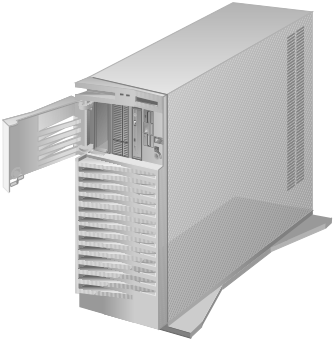PC Server 720 Information and Software
System Type: 8642

The PC Server 720 is renowned as being one of the few heavyweights in x86 computing including supporting up to six Pentium 1 CPUs via the Corollary C-bus II, loads of RAM, and something unique... PCI and MCA slots. It's also an early example of SMP which OS/2 supported at a very early release: something that not even Windows 9x would ever implement.
Downloads
--> IBM PC Server list of various models
--> PC Server 720 User's Reference
--> Hardware Maintenance Manual PC Server 720
--> Flash BIOS update diskette revision 14A version 1.10 - PC Server 720
--> Reference diskette v1.12 - PC Server 720
--> Diagnostic diskette v1.13 - PC Server 720
--> NOS Support Update diskette - PC Server 720
--> PCI Configuration diskette - PC Server 720
--> IBM SCSI-2 Fast/Wide Micro Channel RAID adapter firmware update diskette v2.21 - PC Server 500 / 720
--> IBM SCSI-2 Fast/Wide Streaming Micro Channel RAID Adapter Option diskettes v2.31
--> IBM SCSI-2 Fast/Wide PCI RAID SCO diskette v2.01
--> IBM SCSI-2 Fast/Wide PCI RAID Diagnostic diskette v2.01 (N/A removed too soon to rescue)
--> IBM SCSI-2 Fast/Wide PCI RAID adapter option diskette v2.02 - PC Server 320 / 520 / 720 (N/A removed too soon to rescue)
--> IBM RAID Supplemental Option diskette v2.00 (N/A removed too soon to rescue)
--> OS/2 and Windows 3.1x SVGA driver diskette v1.01 - PC Server 320 / 520 / 720
--> SVGA Support diskette v1.01 - PC Server 720
--> IBM SSA RAID Adapter Configurator and Utility for DOS diskette v1.05
--> IBM Hard Disk Drive Identify Utility diskette v2.10
--> SCO OpenServer 5.0.0 and 5.0.2 diskettes v1.00 - PC Server 720
Key Features
- Six Intel Pentium 1 CPUs
- 512 MB of L2 cache (most Pentium 1s have 256 of L2
- A maximum of 1 GB of RAM
- 470 Watt PSU
- 69 lbs with only one HDD installed
MCA vs. PCI
As this system incorporates both MCA and PCI, it also offers some insight at how the two technologies compare to one another. MCA was released quite some time before PCI; but despite that it still contends very well. MCA has an 80 mbps transfer speed, and PCI has a 132 mbps transfer speed-- according to the manual. Despite MCA being slightly slower (and I sure hope it would be predating PCI by five years), it still offers features not found in PCI, and barely in PCI-express to this day.
As extracted from the Server 720 manual:
The Micro Channel bus provides features not implemented in the PCI bus. These include the streaming-data procedure, channel-check reporting, and error logging.
The streaming-data procedure allows high-speed data transfers between bus masters and subordinates. This procedure supports high-speed transfers of large blocks of data for devices such as hard disk drives and network adapters.
The streaming-data procedure transfers blocks of sequentially stored data. In basic data-transfer operations, a target address is assigned for every byte of data that is transferred. The streaming-data procedure assigns a target address only to the first byte of data; the rest of the data in the block follows in sequence and is assigned to a sequential address. The streaming-data procedure supports a data-transfer rate of 80 MBps, which is four times as fast as basic data-transfer operations. The Micro Channel bus has 32 data lines and 32 address lines. During streaming-data transfer operations, the 32 address lines are used only at the beginning of a transfer cycle; then, they remain idle for the rest of the cycle. The multiplexed streaming-data procedure uses the address bus as another 32-bit data bus, allowing data to be transferred 64 bits at a time.
Errors can occur not only during data-transfer operations, but also while data is stored in system memory. The contents of a memory location can be changed accidentally, a memory module can be defective, or other hardware failures can occur in the server. Your server uses channel-check reporting to detect hardware errors and error logging to record the errors. Service technicians can use these records to diagnose and correct problems in the server. The channel-check reporting facility automatically locates random and intermittent errors while your server is operating. Information about any failing component is saved in the error log so that you can identify and replace the failing component.
